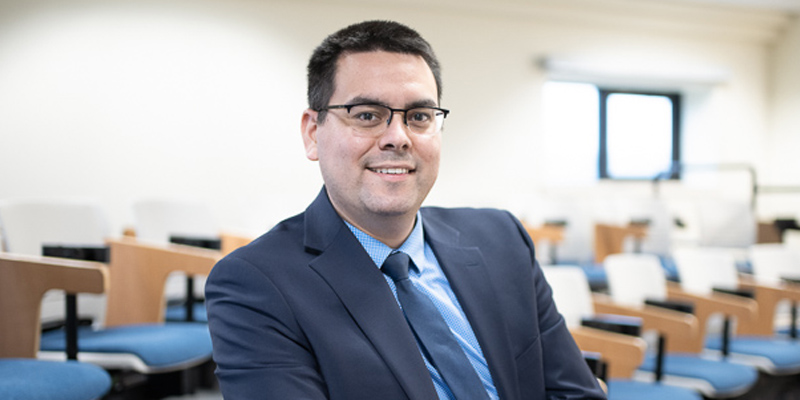'Dream job'

An Inuit faculty member in business law hopes to influence indigenization at Memorial through his research and teaching practice.
Daniel Bennett (B.Comm.(Co-op.)(Hons.)’10) joined the Faculty of Business Administration in June 2022 as an assistant professor.
Although not the first lawyer employed by the faculty, he’s the first hire dedicated to teaching law.
“It’s basically a dream job that I never expected to fall into my lap,” said Prof. Bennett, who’s originally from Pasadena, N.L.
‘If he can do it, so can I’
Prof. Bennett never considered becoming a lawyer.
As a student, he focused his studies on finance and was on the road to becoming a chartered financial analyst before a friend’s plans piqued his own interest.
“I love business and I love numbers. I didn’t even think [law school] was an option until I got into business school. I had a friend that was going to be applying to law school and my thought at the time was, ‘If he can do it, so can I.’”
After completing his commerce degree, Prof. Bennett went on to Osgood Hall Law School at York University in Toronto, where he focused on corporate and Indigenous law.
He graduated in 2013 and was called to the bar in 2014.
Whoever walked in the door, if they needed help, I stepped in.”— Prof. Daniel Bennett
He started his own law firm, Bennett Law, with a broad scope of practice that includes real estate, wills, estates, litigation, criminal law and personal injury.
“Whoever walked in the door, if they needed help, I stepped in.”
Indigenous-focused research program
But Prof. Bennett says he has always been drawn to academia.
“I could have been a student for life,” he said.
Now, he’s teaching a course in business law at Memorial and embarking on a research program focused on Indigenous finance, specifically investment trusts for the Inuit Nunagat, the four Inuit regions of Canada.
To be an advocate for someone’s voice that can be clearly heard is part of, hopefully, a positively shifting landscape.”— Prof. Daniel Bennett
These regions include Inuvialuit (Northwest Territories and Yukon), Nunavik (Northern Quebec), Nunatsiavut (Labrador) and Nunavut.
“The publicly available information is that, collectively, the Inuit Nunagat has into the billions of dollars invested in sophisticated investment portfolios,” Prof. Bennett said. “It’s the intersection of settled land claim areas [that interests me] and, essentially, those people investing funds and using their trust as a means to better their future.”
‘I feel pretty privileged’
Prof. Bennett is looking forward to bringing his legal expertise and Inuit heritage to his teaching and research.
He says in general, and in particular in Newfoundland and Labrador, it’s “probably” been an under-analyzed area, specifically when it comes to law.
“We don’t have a law school in this province and, up until recently, there hasn’t been a tenure track or full-time law professor in the business school,” he said. “I’m sure part of the reason why it’s been under-analyzed and under-researched is there just hasn’t been someone in that position. So I feel pretty privileged to be in that spot.”
With a year of teaching under his belt, Prof. Bennett is optimistic about his new career.
He says it’s fun to teach students.
“In the context of teaching law [and] providing an Indigenous perspective to students, I feel very comfortable communicating some of my personal thoughts as well as navigating some of the complexities of it. I welcome student dialogue to engage with me in that process.
“From a research perspective, I think analyzing, researching and understanding our own Indigenous Peoples here in this province from a legal perspective could be important and impactful work,” he continued. “So, that’s where I would like to leave my mark.”
Prof. Bennett is a trustee of the Labrador Inuit Settlement Land Claims Trust and past chair of the board of directors for SmartICE.
He’s also a former board member of the Conception Bay Area Chamber of Commerce and First Light Friendship Centre.
“I feel in a position of privilege to be able to speak on the issues. To be an advocate for someone’s voice that can be clearly heard is part of, hopefully, a positively shifting landscape.”